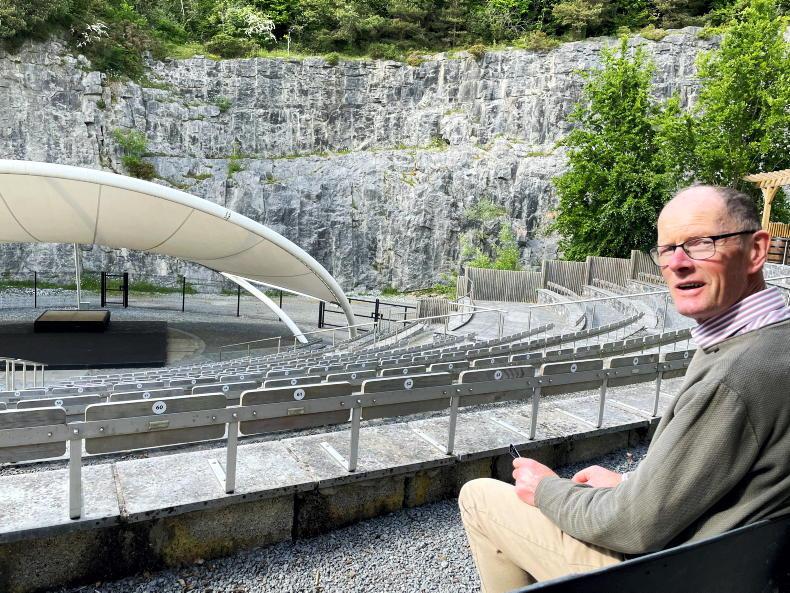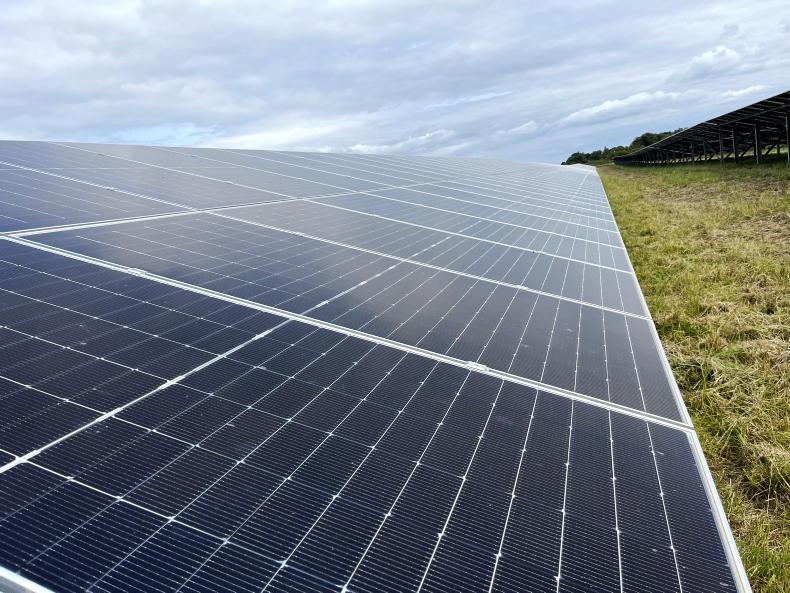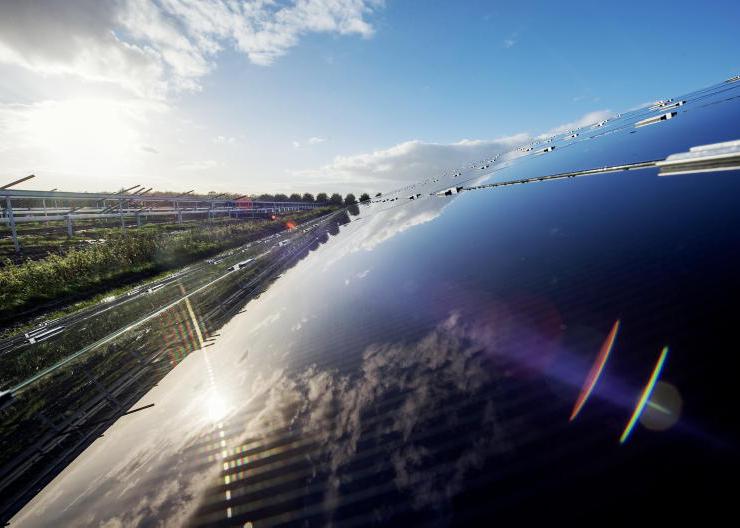“I started as an organic adviser 21 years ago. At that time, organics was underfunded; it was considered very niche.
In the last 15 months, we have seen organics change completely. There are farmers who used 2022 – with the fertiliser prices being so high – to dip their toe into doing a little bit of organic crops or maybe not putting fertiliser out on the field, and they saw that it worked – they got a yield, they saw that it can be done.
At the moment, I am working with a couple of large conventional contractors who are putting in a couple of [organic] fields this year; seeing where it goes.
As an adviser, the largest bulk of farmers ringing me are the new farmers taking over the land. They want to look at organics as an option where they can balance their on-farm life with their off-farm career – with a system that works for them.
They have more control and they have more profit is what the majority of them are saying. Now, there is more paperwork. And there is an inspection, as well, so it does come with its own criteria, but it is a voluntary scheme and 99% are so happy they took the step.
Adapting
I started off as a drystock beef farmer 12 years ago. While I loved having the animals, I cover 32 counties for work and it just wasn’t suiting what I needed to do. I’m very much a small-holder. I only have 23 acres and I am very proud of my 23 acres. It just needed to adapt and change to what suited me.
I put my toe in the water and I grew eight and a half acres of oats one year and kept the cattle on the rest of it. That was so successful – and so profitable, if I am honest – that the next year, the cattle went and the whole lot went into organic oats for Flahavan’s.
Because I am organic, I can only grow oats two or three years in a row without having to feed back the soil again, so I put in red clover into that first eight and a half acres just before I went to Vietnam.
I just bought my first piece of farm machinery – a mulcher mower – and that is going to be mowed for the next year and a half or so before going back into oats.
A TV adventure
Because of my advisory work, I’m a member of the Agricultural Consultants’ Association. An email was sent out looking for a person to go on this adventure [the television programme].

Eveline Gill from outside Tullamore, Co Offaly took off to Vietnam after harvest 2022 as part of the RTÉ series, Faraway Fields.
I read the email, picked up the phone, rang one of my colleagues – she is a beef farmer, so she was never going to be my competition – read it to her and she said, ‘you’ve gotta go for it.’
So, I rang the number, it rang out and I said: ‘I made the effort, it’s not meant to be.’
Five minutes later, the phone rings back and it all went from there. Bizarrely, it will be a full 365 days from that initial email to when it aired on RTÉ 1.
On arrival
Two weeks before we got on the plane, I realised we were going to Hanoi; I knew very little really about where I was going.
When you walk out the door in Vietnam, climate change is evident in front of you. The banks [of land] are disappearing. The roads are subsiding; it took us one hour to do 20km.
When the production team were looking for locations to go to, one of the places actually flooded out just a week before we arrived and we ended up not being able to go there. That meant the people living there, working the land, had lost their entire harvest.
We were five hours of a drive from Hanoi, up on a mountainside. Along the way, we drove though the deltas, where the larger farms are. This is where the commercial crops are grown. There was a harvest going on as we passed through. They can get about three crops a year, in the better areas.
Even still, the combines they were using were the size we would be using in crop trials here.
Where I was, rice is grown for themselves; for their own cupboards. It is not going off in a lorry for processing and export; this is for their survival.
Very roughly speaking, it took us the best part of two weeks to harvest 50 bags of rice. Each bag weighed about 80kg, so 4t. Here at home, my contractors combine harvests the best part of 40t in six hours.
Out harvesting with them, some of the paddy fields might have been about 1ft wide, maybe 18in wide. Animals, if brought up there, would trample down the sides of the terraces.
It is a very different world we live in, the main being that we have so many different options and they don’t. We are all going to have our own little things we will struggle with, but when you look at the global picture, it is easy to see how good we have it here, in the long run.”
Farmorganic.ie
Read more
Recreational funding of €50,000 for midlands bogland conversion
Entries open for 2023 Tullamore National Livestock Show
“I started as an organic adviser 21 years ago. At that time, organics was underfunded; it was considered very niche.
In the last 15 months, we have seen organics change completely. There are farmers who used 2022 – with the fertiliser prices being so high – to dip their toe into doing a little bit of organic crops or maybe not putting fertiliser out on the field, and they saw that it worked – they got a yield, they saw that it can be done.
At the moment, I am working with a couple of large conventional contractors who are putting in a couple of [organic] fields this year; seeing where it goes.
As an adviser, the largest bulk of farmers ringing me are the new farmers taking over the land. They want to look at organics as an option where they can balance their on-farm life with their off-farm career – with a system that works for them.
They have more control and they have more profit is what the majority of them are saying. Now, there is more paperwork. And there is an inspection, as well, so it does come with its own criteria, but it is a voluntary scheme and 99% are so happy they took the step.
Adapting
I started off as a drystock beef farmer 12 years ago. While I loved having the animals, I cover 32 counties for work and it just wasn’t suiting what I needed to do. I’m very much a small-holder. I only have 23 acres and I am very proud of my 23 acres. It just needed to adapt and change to what suited me.
I put my toe in the water and I grew eight and a half acres of oats one year and kept the cattle on the rest of it. That was so successful – and so profitable, if I am honest – that the next year, the cattle went and the whole lot went into organic oats for Flahavan’s.
Because I am organic, I can only grow oats two or three years in a row without having to feed back the soil again, so I put in red clover into that first eight and a half acres just before I went to Vietnam.
I just bought my first piece of farm machinery – a mulcher mower – and that is going to be mowed for the next year and a half or so before going back into oats.
A TV adventure
Because of my advisory work, I’m a member of the Agricultural Consultants’ Association. An email was sent out looking for a person to go on this adventure [the television programme].

Eveline Gill from outside Tullamore, Co Offaly took off to Vietnam after harvest 2022 as part of the RTÉ series, Faraway Fields.
I read the email, picked up the phone, rang one of my colleagues – she is a beef farmer, so she was never going to be my competition – read it to her and she said, ‘you’ve gotta go for it.’
So, I rang the number, it rang out and I said: ‘I made the effort, it’s not meant to be.’
Five minutes later, the phone rings back and it all went from there. Bizarrely, it will be a full 365 days from that initial email to when it aired on RTÉ 1.
On arrival
Two weeks before we got on the plane, I realised we were going to Hanoi; I knew very little really about where I was going.
When you walk out the door in Vietnam, climate change is evident in front of you. The banks [of land] are disappearing. The roads are subsiding; it took us one hour to do 20km.
When the production team were looking for locations to go to, one of the places actually flooded out just a week before we arrived and we ended up not being able to go there. That meant the people living there, working the land, had lost their entire harvest.
We were five hours of a drive from Hanoi, up on a mountainside. Along the way, we drove though the deltas, where the larger farms are. This is where the commercial crops are grown. There was a harvest going on as we passed through. They can get about three crops a year, in the better areas.
Even still, the combines they were using were the size we would be using in crop trials here.
Where I was, rice is grown for themselves; for their own cupboards. It is not going off in a lorry for processing and export; this is for their survival.
Very roughly speaking, it took us the best part of two weeks to harvest 50 bags of rice. Each bag weighed about 80kg, so 4t. Here at home, my contractors combine harvests the best part of 40t in six hours.
Out harvesting with them, some of the paddy fields might have been about 1ft wide, maybe 18in wide. Animals, if brought up there, would trample down the sides of the terraces.
It is a very different world we live in, the main being that we have so many different options and they don’t. We are all going to have our own little things we will struggle with, but when you look at the global picture, it is easy to see how good we have it here, in the long run.”
Farmorganic.ie
Read more
Recreational funding of €50,000 for midlands bogland conversion
Entries open for 2023 Tullamore National Livestock Show










SHARING OPTIONS